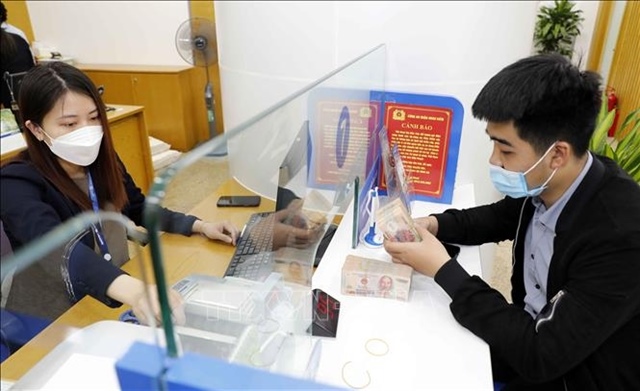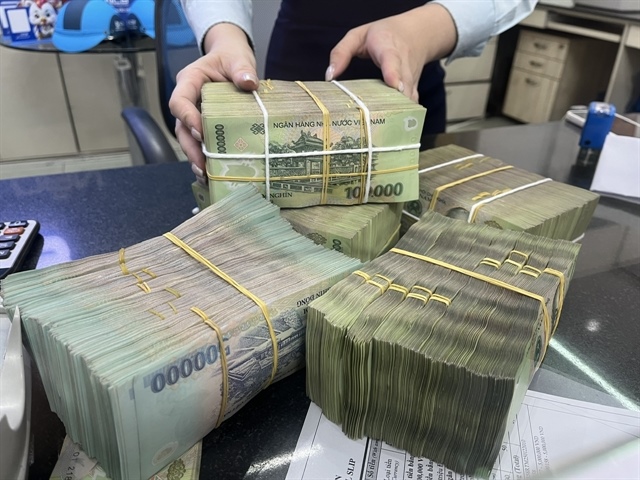SBV makes third exchange rate adjustment this year
SBV makes third exchange rate adjustment this year
On August 19, the State Bank of Vietnam (SBV) increased the average interbank dollar exchange rate by 1 per cent from VND21,673 to VND21,890. The SBV also increased the trading band from +/-2 per cent out to +/-3 per cent. As a result, the ceiling price is now VND22,547, while the floor price is VND21,233 per $1. These moves followed changes made on August 12, when the SBV expanded the trading band from +/-1 per cent to +/-2 per cent.

The SBV stated at the end of last year that it would not increase the exchange rate by more than 2 per cent this year. However, it had already used up this quota by increasing the interbank exchange rate by 1 per cent on January 7 and again on May 7. The latest moves therefore bring the total increase in the reference rate to 2 per cent this year.
Furthermore, the widening of the band actually allows for a 5.4 per cent devaluation year-to-date to the new ceiling price. However, in our opinion, the exchange rate adjustment this time is a correct, reasonable and timely decision, following the new movements of the market. This year, several key currencies have been devalued against the dollar, including the JPY and the RUB. Perhaps most significantly, China devalued the yuan (CNY) by 4.6 per cent within three days this month. Devaluations this year through August 18 have included: JPY (-3.24 per cent), RUB (-12.04 per cent), CNY (-5.44 per cent), while a few currencies have recovered from their poor performances last year, including the EUR (+8.15 per cent) and the AUD (+9.25 per cent).
Following the CNY devaluations, the currencies of several regional countries also dropped. For example, THB (-7.79 per cent), MMK (-23.12 per cent), IDR (-9.4 per cent), MYR (-16.08 per cent). Immediately after the SBV adjusted the trading band from one per cent to two per cent, the exchange rate VND/USD in the market rose. The USD traded at commercial banks at its ceiling price while in the over-the-counter (OTC) market, the rate exceeded the allowed cap.
Facing intense pressure from the market, the central bank had expended about $400 million of foreign reserves to support the exchange rate on August 11 and another $300 million on August 14. From the beginning of 2015 to August 14, the SBV had sold more than $3 billion to hold up the VND. However, this action would be unsustainable over the long run because it would cause foreign exchange reserves of Vietnam to drop to an unsafe level. According to calculations by the Ministry of Planning and Investment based on the currency structure of the national debt, a 1 per cent increase in the exchange rate will increase the debt obligation by approximately VND10,000 billion ($4.65 billion). This will exacerbate the current concerns regarding the fiscal deficit.
However, failure to act would have increased pressure to raise VND interest rates. Timely VND devaluation will help maintain the current level of interest rates. Yields on government bonds, which rose sharply after last week’s move, will be revised down somewhat this week. So this will help the government and businesses to avoid increased borrowing costs. In the foreign exchange market, the exchange rate at commercial banks jumped shortly in line with the newly adjusted interbank rate. As of August 21, the asking price at some banks had already increased to VND22,480 per $1, VND67, or 0.3 per cent, below the ceiling cap.
Although stocks have been falling recently, much of that is due to the separate issue of oil prices. We believe that the recent VND devaluation is actually a positive development for the stock market in general because it brings the value of VND to a more market-based level. If the SBV delayed the devaluation, investors, both foreign and domestic, would have the tendency to sell stocks and buy USD until the VND was devalued. Now that the devaluation is behind us, the market has no more momentum to sell for this reason. Foreign investors, in particular, may be more interested to enter at the new exchange rate. The increase in bond yields that resulted from the currency devaluation also hurt stocks. The VND devaluation caused bond yields to rise significantly. There is a strong negative correlation between bond yields and stock price-earnings (P/E) ratios. So it follows that this week’s events would negatively impact P/E ratios. If investors are confident that the currency is now properly valued and bond yields can recover, then the effects will be short-lived. But equity investors should watch the government bond market closely.
Some sectors to benefit from the devaluation of VND are those that have revenue in foreign currencies like export sectors, especially those that import input materials from China. For example in textiles (TCM, TNG and KMR), fisheries (HVG, VHC, FMC and IDI), as well as oil and gas (PVD, PVS and GAS).
The sectors to be hurt include those that have revenue in VND, but import input materials from abroad (other than from China) or those that borrow heavily in dollar. These include energy (NT2, PPC, BTP), sea transport (VOS, PVT and VTO), cement (HT1, BCC and BTS), and pharmaceuticals (DHG, IMP and DMC).
























